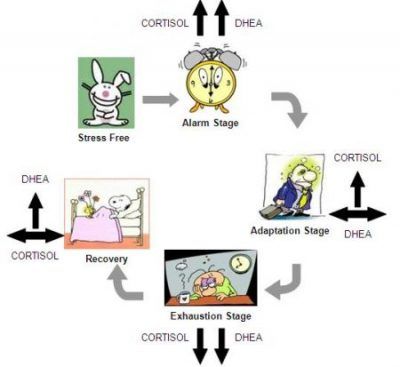As the evidence against massive amounts of cardio (cardiovascular training) continues to mount, it becomes an impossible task to break this information down into one article so for now we will focus on the topic of the effect the extra stress produced by this type of overtraining has on the body from a physiologically point of view, rather than the obvious physical stressors of injuries etc.
There has been more of an awareness of late of the production of the stress hormone cortisol during strenuous activity and the damage that this can have on our health. Cortisol is secreted by the adrenal glands to signal to the rest of the body that energy must be conserved. Skeletal muscle is the most inefficient tissue in the body when it comes to energy storage, consequently, cortisol will cause the stressed body to turn on its muscle stores as its first possible source of energy. Fat, on the other hand, is the most energy efficient tissue in the body and as such, cortisol slows down your thyroid to conserve fat stores. This is the opposite of what our metabolic goal is as to increase our metabolism we need to increase muscle mass and reduce fat stores. Consequently, those who are trying to lose fat should aim to keep cortisol levels as low as possible since high levels of this hormone could inhibit their progress significantly.
Proper amounts of stress and cortisol trigger growth and increased capability in terms of cardiovascular health, muscle strength and general awareness. That growth occurs during the rest and recovery period, not during the exercise itself. It is during the rest period after exercise that endorphins and growth hormone are released, endorphins and growth hormone flush cortisol out of your body. (See article The Importance of Rest).
While exercise results in endorphin release and can relieve stress, extended workouts stress the body and increase cortisol levels in a cumulative way. Aerobic workouts that last longer than 45 minutes and strength training that goes on for longer than an hour can cause cortisol levels to rise in a way that ultimately has negative health effects on the body rather than positive ones.
As cortisol is involved in the fight or flight reaction to stress, this steroid hormone alters your metabolism to provide immediate energy to deal with stress. Chronic and prolonged stress elevates cortisol levels and triggers an emergency situation in the body, again fat is preserved and muscle mass is broken down, the immune system is weakened and the heart rate and blood pressure are also affected.
Extended workouts can also lead to ‘overtraining syndrome’, a neuroendocrine disorder. High cortisol levels lead to altered sleep patterns, decreased performance and reduced testosterone levels while fatigue is the most common result of overtraining and often is accompanied by depression, irritability or loss of enthusiasm for exercise. If you find you are no longer feeling invigorated by your training routine and often feel more as though you are going backwards, you might need to seek guidance from a professional to look at what adjustments you can make to put you back on the right track.
The post Exercise and Cortisol Levels-Rejuvenate Health Retreats. appeared first on Rejuvenate.






